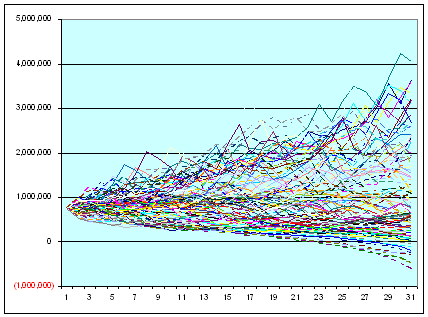I am one of those Y2K retiree who should be growing broke if I took a 4% SWR.
According Raddr's
calculation, a $1 million portfolio would have started 2013 worth $493,000 (358,000 Y2K dollars and my inflation adjusted withdrawal would be about $56,000. This year the portfolio would actually make money for the first time in a long time.
I avoid many of the worse problems of the Y2K portfolio (primarily by withdrawing only between 2.5-3% most years.). However, my portfolio didn't get back to its nominal level until 2007 and then again the end of 2010. In real terms I start 2013 about 10% behind what retired with in 99/2000 and am comfortably ahead of it in real dollars today.
Still having two ugly bear markets at the first 8 years of your retirement is not recommended.
I am surely glad that I left the failing business ventures in 2003 and started making money again, and did not throw in the towel and leave work for real.
Without that good-paying part-time consulting work, I would be broke when my wife left work for real a few years later due to unbearable pressure at her megacorps, and both of my children were in college.
NW-Bound..don't want to hijack this thread but want to answer the question you posed to me. The beach cottage or second home, if you will, would be to increase our quality of life. I know we would enjoy it if I could find it which I haven't yet.
...
I hear you on selling the 2nd home even if at a loss if one of you gets sick. Perhaps I need to change my perspective on this. It's just that the older I get, the less hassle I seem to want. Can't have it both ways, huh

?
One can nearly always trade money for the hassle. This is of course easy if one has an abundance of the former, but the frugal mentality often gets in the way too. It's a balance that we all need to fine tune.
For all who say their portfolios went up, I'm curious. Is that UP after you went down during 2008 financial crisis or is that UP from where your portfolios were prior to the financial crisis?
I maintain a diary going back to 1999. It has the total daily value of my portfolio, the Dow, NASDAQ, and the S&P500. For simplicity I did not breakdown into retirement accounts, after-tax brokerages, etc... Nor did I log inflow and outflow.
The finer details should be already stored in MS Money, except that I did not set it up to cover checking account, where my earned income got deposited. And there was no easy way to retrieve deposits and withdrawals from the tracked accounts.
When MS Money went defunct in 2009, I switched to Quicken and have been doing a better job of logging all financial activities. It was about time, as I was contemplating ER seriously when I saw that my expenses were going down when my children were done with schooling.
However, I still maintain my diary, which is the first thing I refer to when looking for historical values of my liquid assets - I do not even carry the RE values in Quicken.
Now, back to your question, we would fool ourselves if we pat our own back for comparing market tops to market bottoms of our portfolio. From the bottom of the Great Recession, I am up 1.85X, compared to the S&P of 2.87X. I trail the S&P due to not being invested 100% at any time, let alone at the market bottom. I also hold very little bonds, so my large cash stash holds me back. The S&P has dividends which were not included in the number above, but my number included withdrawals, so let's call it even.
If counted from the top in 2007, then I am up a mere 1.17X, exactly tracking the S&P. However, I had withdrawals and was never 100% invested, so I am still OK with what I got. I am not an indexer by the way.
PS. All the above numbers were not adjusted for inflation, which would make them look less well.



